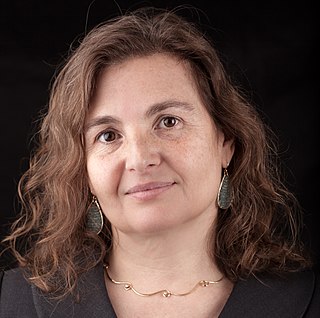Related Research Articles

The School of Computer Science (SCS) at Carnegie Mellon University in Pittsburgh, Pennsylvania, US is a school for computer science established in 1988. It has been consistently ranked among the top computer science programs over the decades. As of 2022 U.S. News & World Report ranks the graduate program as tied for second with Stanford University and University of California, Berkeley. It is ranked second in the United States on Computer Science Open Rankings, which combines scores from multiple independent rankings.

Cynthia Breazeal is an American robotics scientist and entrepreneur. She is a former chief scientist and chief experience officer of Jibo, a company she co-founded in 2012 that developed personal assistant robots. Currently, she is a professor of media arts and sciences at the Massachusetts Institute of Technology and the director of the Personal Robots group at the MIT Media Lab. Her most recent work has focused on the theme of living everyday life in the presence of AI, and gradually gaining insight into the long-term impacts of social robots.
Human–robot interaction (HRI) is the study of interactions between humans and robots. Human–robot interaction is a multidisciplinary field with contributions from human–computer interaction, artificial intelligence, robotics, natural language processing, design, and psychology. A subfield known as physical human–robot interaction (pHRI) has tended to focus on device design to enable people to safely interact with robotic systems.

Rosalind Wright Picard is an American scholar and inventor who is Professor of Media Arts and Sciences at MIT, founder and director of the Affective Computing Research Group at the MIT Media Lab, and co-founder of the startups Affectiva and Empatica.
In computer science, programming by demonstration (PbD) is an end-user development technique for teaching a computer or a robot new behaviors by demonstrating the task to transfer directly instead of programming it through machine commands.

Leonardo is a 2.5 foot social robot, the first created by the Personal Robots Group of the Massachusetts Institute of Technology. Its development is credited to Cynthia Breazeal. The body is by Stan Winston Studios, leaders in animatronics. Its body was completed in 2002. It was the most complex robot the studio had ever attempted as of 2001. Other contributors to the project include NevenVision, Inc., Toyota, NASA's Lyndon B. Johnson Space Center, and the Navy Research Lab. It was created to facilitate the study of human–robot interaction and collaboration. A DARPA Mobile Autonomous Robot Software (MARS) grant, Office of Naval Research Young Investigators Program grant, Digital Life, and Things that Think consortia have partially funded the project. The MIT Media Lab Robotic Life Group, who also studied Robonaut 1, set out to create a more sophisticated social-robot in Leonardo. They gave Leonardo a different visual tracking system and programs based on infant psychology that they hope will make for better human-robot collaboration. One of the goals of the project was to make it possible for untrained humans to interact with and teach the robot much more quickly with fewer repetitions. Leonardo was awarded a spot in Wired Magazine’s 50 Best Robots Ever list in 2006.
The Institute for Robotics and Intelligent Machines (IRIM@GT) is an interdisciplinary research unit at the Georgia Institute of Technology. The center was launched May, 2006, and consists of researchers from the School of Interactive Computing in the College of Computing, College of Engineering, and Georgia Tech Research Institute. IRIM@GT currently offers a Ph.D. program in robotics, the first truly multi-disciplinary program in the country after the one of Carnegie Mellon University.

Ayanna MacCalla Howard is an American roboticist, entrepreneur and educator currently serving as the dean of the College of Engineering at Ohio State University. Assuming the post in March 2021, Howard became the first woman to lead the Ohio State College of Engineering.

Daniela L. Rus is a roboticist and computer scientist, Director of the MIT Computer Science and Artificial Intelligence Laboratory (CSAIL), and the Andrew and Erna Viterbi Professor in the Department of Electrical Engineering and Computer Science (EECS) at the Massachusetts Institute of Technology.

Maja Pantić is a Professor of Affective and Behavioural Computing at Imperial College London and an AI Scientific Research Lead in Facebook London. She was previously Professor of Affective and Behavioural Computing University of Twente and Research Director of the Samsung AI lab in Cambridge, UK. She is an expert in machine understanding of human behaviour including vision-based detection and tracking of human behavioural cues like facial expressions and body gestures, and multimodal analysis of human behaviours like laughter, social signals and affective states.
Stephen E. Levinson is a professor of Electrical and Computer Engineering at the University of Illinois at Urbana-Champaign (UIUC), leader of the Language Acquisition and Robotics Lab at UIUC, and a full-time faculty member of the Beckman Institute for Advanced Science and Technology at UIUC. He works on speech synthesis, acquisition and recognition and the development of anthropomorphic robots.

Pieter Abbeel is a professor of electrical engineering and computer sciences, Director of the Berkeley Robot Learning Lab, and co-director of the Berkeley AI Research (BAIR) Lab at the University of California, Berkeley. He is also the co-founder of covariant.ai, a venture-funded start-up that aims to teach robots new, complex skills, and co-founder of Gradescope, an online grading system that has been implemented in over 500 universities nationwide. He is best known for his cutting-edge research in robotics and machine learning, particularly in deep reinforcement learning. In 2021, he joined AIX Ventures as an Investment Partner. AIX Ventures is a venture capital fund that invests in artificial intelligence startups.

Margarita Chli is an assistant professor and leader of the Vision for Robotics Lab at ETH Zürich in Switzerland. Chli is a leader in the field of computer vision and robotics and was on the team of researchers to develop the first fully autonomous helicopter with onboard localization and mapping. Chli is also the Vice Director of the Institute of Robotics and Intelligent Systems and an Honorary Fellow of the University of Edinburgh in the United Kingdom. Her research currently focuses on developing visual perception and intelligence in flying autonomous robotic systems.
Vivian Chu is an American roboticist and entrepreneur, specializing in the field of human-robot interaction. She is Chief Technology Officer at Diligent Robotics, a company she co-founded in 2017 for creating autonomous, mobile, socially intelligent robots.

Rita Cucchiara is an Italian electrical and computer engineer, and professor in Computer engineering and Science in the Enzo Ferrari Department of Engineering at the University of Modena and Reggio Emilia (UNIMORE) in Italy. She helds the courses of “Computer Architecture” and “Computer Vision and Cognitive Systems”. Cucchiara's research work focuses on artificial intelligence, specifically deep network technologies and computer vision for human behavior understanding (HBU) and visual, language and multimodal generative AI. She is the scientific coordinator of the AImage Lab at UNIMORE and is director of the Artificial Intelligence Research and Innovation Center (AIRI) as well as the ELLIS Unit at Modena. She was founder and director from 2018 to 2021 of the Italian National Lab of Artificial Intelligence and intelligent systems AIIS of CINI. Cucchiara was also president of the CVPL from 2016 to 2018. Rita Cucchiara is IAPR Fellow since 2006 and ELLIS Fellow since 2020.

Andrew B. Williams is an American academic in the field of engineering. He is currently the Dean of Engineering and the Louis S. LeTellier Chair for The Citadel School of Engineering in Charleston. It comes with a rank of Colonel in the SCM. He was the Associate Dean for Diversity, Equity, and Inclusion at the University of Kansas, and the Charles E. and Mary Jane Spahr Professor in Electrical Engineering and Computer Science.
Kerstin Dautenhahn is a German computer scientist specializing in social robotics and human–robot interaction. She is a professor of electrical and computer engineering at the University of Waterloo, where she holds the Canada 150 Research Chair in Intelligent Robotics and directs the Social and Intelligent Robotics Research Laboratory.
Hatice Gunes is a Turkish computer scientist who is Professor of Affective Intelligence & Robotics at the University of Cambridge. Gunes leads the Affective Intelligence & Robotics Lab. Her research considers human robot interactions and the development of sophisticated technologies with emotional intelligence.
Angelica Lim is an American-Canadian AI roboticist. She first started researching robots in 2008. Lim is currently an assistant professor in Computing Science at Simon Fraser University in Canada. She is also the head and founder of the Simon Fraser University Rosie Lab, which specializes in AI software development. Much of her work involves exploring the emotional capabilities of AI machines, and how AI interacts with music. Lim is the first to provide a scientifically published definition and implementation for robot feelings.

Mai Lee Chang is a part of the International Space Station (ISS) Flight Crew Integration team and the Orion Human Engineering team for designing the Orion spacecraft.
References
- ↑ "Andrea L. Thomaz" . Retrieved 17 November 2022.
- ↑ "Andrea Thomaz". gatech.edu. Retrieved 18 November 2022.
- ↑ "Socially Intelligent Machines Lab" . Retrieved 18 November 2022.
- ↑ "Andrea L. Thomaz". utexas.edu. Retrieved 23 November 2022.
- ↑ "To prevent nurse burnout, a 35-year-old engineer built a time-saving robot that's now deployed at top U.S. hospitals". 16 November 2022.
- ↑ "TR35: Andrea Thomaz". 18 August 2009.
- ↑ "Brilliant 10: Andrea Thomaz Teaches Robots to Learn from Humans". www.popsci.com. 10 October 2012.
- ↑ "andrea-thomaz". tedxpeachtree.com. Retrieved 23 November 2022.
- ↑ "The vision of our research is to enable robots to function in dynamic human environments by allowing them to flexibly adapt their skill set via learning interactions with end-users" . Retrieved 24 November 2022.
- ↑ Breazeal, C.; Kidd, C.D.; Thomaz, A.L.; Hoffman, G.; Berlin, M. (5 December 2005). "Effects of nonverbal communication on efficiency and robustness in human-robot teamwork". 2005 IEEE/RSJ International Conference on Intelligent Robots and Systems. pp. 708–713. doi:10.1109/IROS.2005.1545011. ISBN 0-7803-8912-3.
- ↑ "Teachable robots: Understanding human teaching behavior to build more effective robot learners". 9 August 2006.
- ↑ "Policy Shaping: Integrating Human Feedback with Reinforcement Learning". 5 June 2013.